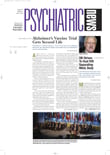President John F. Kennedy in 1963 sent a message to Congress calling for a“ bold new approach” to the problems of mental illness and retardation. That approach was made concrete in the Community Mental Health Centers Act of 1963.
Kennedy envisioned community mental health centers (CMHCs) that would enable “a patient [to] move without difficulty or delay to different services—from diagnosis to cure to rehabilitation—without need to transfer to different institutions located in different communities.”
Congress originally approved funds for construction only, adding funds for staff in 1965. The level of funding decreased over a seven-year period. In 1972 President Richard Nixon argued that federal support for the centers should be phased out and replaced with local support. Instead, in 1975, with new legislation, seven new services were added to the original five that were deemed “essential.”
By 1977, 650 centers had been funded, covering 43 percent of the U.S. population and serving 1.9 million people that year.
President Jimmy Carter submitted the Mental Health Systems Act to Congress in 1979, where it was subjected to much debate but ultimately passed.
President Ronald Reagan in 1981 signed the Omnibus Budget Reconciliation Act, which “substantially repealed the Mental Health Systems Act.... The federal government was entirely removed from the direction of the program and became a mere conduit of funds to the states,” according to an account in Madness and Government, published by American Psychiatric Press Inc. in 1983.
What happened to that bold, new approach?
Former APA President Paul Appelbaum, M.D., told a Senate committee in 2003 that the original legislation represented a “terrific concept” but said later that the centers often are regarded as “hostile territory” because many of them underwent a process of“ demedicalization” that minimized the importance of psychiatric leadership (Psychiatric News, February 6, 2004).
Medicaid has become a primary source of funds, often with the result that only Medicaid-eligible populations are served, and only Medicaid-reimbursable services are offered.
Psychiatric News wants to take a look at CMHCs from the inside to find out what remains of that original concept and what has taken its place.
Kenneth Thompson, M.D., posted a request on the list serve of the American Association of Community Psychiatrists asking for nominations of CMHCs to be featured in a three-part series in Psychiatric News.
Judging by the responses, many CMHCs are alive and—if not entirely flourishing— still able to find ways to offer quality treatment and services.
Horizon House, which is featured in this issue, was established in 1952 to help former mental hospital patients provide support to each other as they lived outside the hospital. The name of that concept of care has changed several times during the intervening years, but the institution has maintained its focus on psychosocial rehabilitation while developing strengths in the medical aspects of treatment.
In the fall, Psychiatric News will report on the Connecticut Mental Health Center, which boasts an ambitious research agenda, new efforts to translate research into practice, and an enviable service-penetration rate.▪
